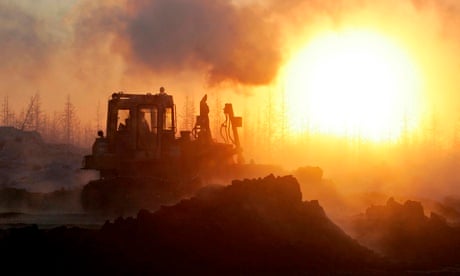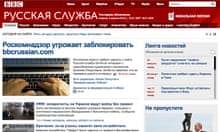Russian authorities have banned a Siberian independence march and threatened to block the BBC Russian service over its coverage of separatist protests.
In sharp contrast to the treatment of separatists in Crimea and eastern Ukraine, Moscow has made it clear that it does not welcome similar aspirations at home.
The media watchdog may block the website of the BBC Russian service over an interview with Artyom Loskutov, an organiser of the March for Siberian Federalisation, the newspaper Izvestiya reported on Tuesday. The march was due to take place on 17 August in Novosibirsk, Siberia's largest city.
The federal communications monitoring service has sent a letter demanding the interview be deleted for violating a recently passed law against "calls to mass unrest, extremist activities or participation in illegal public events".
The BBC said it had no plans to remove the material in question and had requested an interview with Russian officials about the matter.
Russia's prosecutor general has issued warnings to 14 media outlets covering the protest under the country's extremism law, and blocked an event page for the march on Russia's most popular social network. The editor of Slon.ru, which was forced by the prosecutor general to remove an interview with Loskutov, later argued in a Facebook post that the article had not been in violation of the extremism law because it did not name a specific time or place. It also noted that the activists had not yet been given permission for the march.
The Novosibirsk mayor's office reportedly denied permission on Tuesday to hold the march "in order to ensure the inviolability of the constitutional order, territorial integrity and sovereignty of the Russian Federation".
Loskutov, an artist who is known for organising an annual absurdist rally called Monstration, told the Guardian that the activists had re-applied for permission to hold a March for the Inviolability and Observation of the Principles of Federalism.
Washington and Kiev have said Russia is providing arms, men and funding to the separatist rebels fighting government forces in eastern Ukraine, while cracking down on similar trends at home. Moscow passed a law in December to make spreading separatist views punishable by up to five years in jail.
Loskutov said the Novosibirsk protest was meant to both ridicule the Kremlin's hypocrisy on self-determination in Ukraine and to raise the issue of Siberia's delayed development. Most of Russia's oil and gas output comes from western Siberia, but the region lags behind Moscow, St Petersburg and some southern areas in quality of life ratings.
"It's using the rhetoric that our government and their propaganda use," Loskutov said. "They decided to tell us how great it is when some republic moves for self-determination. Okay, well let's apply this to other regions. Can Siberia allow itself this same rhetoric? It turns out it can't."
Olesya Gerasimenko, a correspondent for the Kommersantnewspaper, said most Russians in the regions would not support secession, but would back greater economic autonomy, including measures forcing resource extraction companies to pay taxes in the regions where they operate rather than in Moscow.
"If we support the Ukrainian people's right to federalisation, why don't we support the Russian people's right to federalisation?" Gerasimenko asked. "The mood of the separatists in Russia is socio-economic in nature, not for the autonomy of a certain region, so this is all exaggerated. But in light of recent events in Ukraine, it seems more dangerous."




Comments (…)
Sign in or create your Guardian account to join the discussion